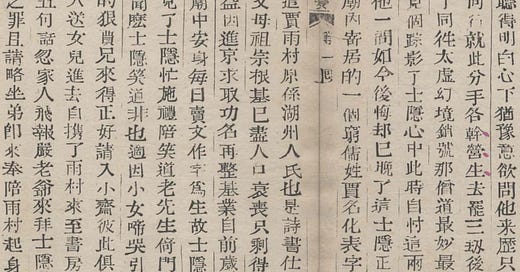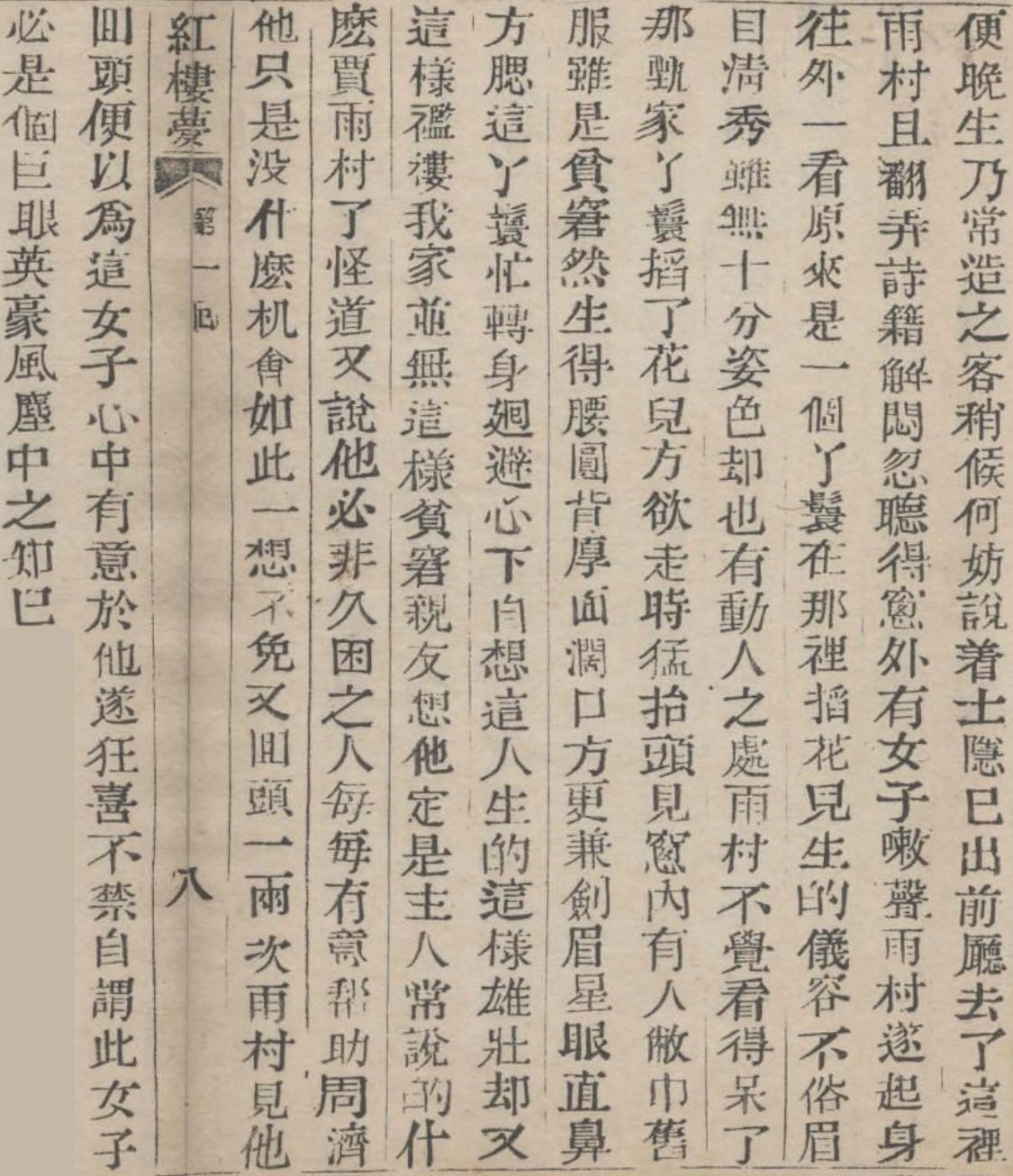We’ve got a longer segment today — and I probably could have extended this a bit as well. Zhen Shiyin wants to ask who the monk and priest are, but they vanish before he has the chance. His friend Jia Yucun comes over, and they chat briefly. Zhen Shiyin suddenly has another visitor, and Jia Yucun spots one of Shiyin’s maids, who he falls in love with instantly.
Chinese Text
士隱聽得明白,心下猶豫,意欲問他來歷,只聽道人說道:「你我不必同行,就此分手,各幹營生去罷。三劫後,我在北邙山等你,會齊了,同往太虛幻境銷號。」那僧道:「最妙,最妙。」說畢,二人一去,再不見個蹤影了。士隱心中此時自忖:「這兩人必有來歷,很該問他一問,如今後悔卻已晚了!」
這士隱正在痴想,忽見隔壁葫蘆廟內寄居的一個窮儒:姓賈名化,表字時飛,別號雨村的,走來。這賈雨村原系湖州人氏,也是詩書仕宦之族。因他生於末世,父母祖宗根基已盡,人口衰喪,只剩得他一身一口,在家鄉無益,因進京求取功名,再整基業。自前歲來此,又淹蹇住了,暫寄廟中安身,每日賣文作字為生,故士隱常與他交接。
當下雨村見了士隱,忙施禮,陪笑道:「老先生倚門佇望,敢街市上有甚新聞麼?」士隱笑道:「非也。適因小女啼哭,引他出來作耍,正是無聊的很。賈兄來得正好,請入小齋,彼此俱可消此永晝。」說著,便令人送女兒進去,自攜了雨村來至書房中。小童獻茶。方談得三五句話,忽家人飛報:「嚴老爺來拜。」士隱慌忙起身謝道:「恕誆駕之罪。且請略坐,弟即來奉陪。」雨村起身也讓道:「老先生請便。晚生乃常造之客,稍候何妨。」說著,士隱已出前廳去了。
這裡雨村且翻弄詩籍解悶。忽聽得窗外有女子嗽聲,雨村遂起身往外一看,原來是一個丫鬟在那裡掐花兒。生得儀容不俗,眉目清秀,雖無十分姿色,卻也有動人之處。雨村不覺看得呆了。那甄家丫鬟掐了花兒,方欲走時,猛抬頭見窗內有人,敞巾舊服,雖是貧窘,然生得腰圓背厚,面闊口方,更兼劍眉星眼,直鼻方腮。這丫鬟忙轉身迴避,心下自想:「這人生的這樣雄壯,卻又這樣襤褸,我家並無這樣貧窘親友,想他定是主人常說的什麼賈雨村了。怪道又說他『必非久困之人!』每每有意幫助賙濟他,只是沒有什麼機會。」如此一想,不免又回頭一兩次。雨村見他回頭,便以為這女子心中有意於他,遂狂喜不禁,自謂此女子必是個巨眼英豪,風塵中之知己。
Translation Notes
三劫 means “three kalpas,” and refers to an immensely long period of time – one much longer than a human can contemplate. Kalpa (कल्प) is a Sanskrit word that refers to 4,320,000,000 years in human time, and basically means a really long time.
北邙山, Mount Beimang, is a mountain north of Luoyang and is the traditional burial site of many emperors, nobles, and literati. In some poems, such as those of Bai Juyi, it is used symbolically to meditate on morality. The Taoist is foreshadowing a reunion with Zhen Shiyin beyond death.
銷號 literally means to “erase the registration.” What the priest is telling Zhen Shiyin is that they can go together to the celestial realm to undo his registration and close his bureaucratic books. Of course, that doesn’t offer much solace to somebody who has just lost his daughter!
最妙 (“most sublime,” or “most excellent”) is an extremely sarcastic response by the monk, who clearly sees no problem with the awful fate about Yinglian that they just revealed.
表字 is a “courtesy name,” a name that was once given to men who turned 20 years old during the so-called “capping ceremony” (冠禮). In classical texts, this is often just referred to as 字. In ancient times, using somebody’s given name was considered rude, and so the courtesy name was most often used.
別號 means “another name or “pseudonym,” and is a kind of an art name. Usually this carried a philosophical or literary significance. Sometimes this was used to separate the creative identity of the person from their public roles. For example, Cao Xueqin (曹雪芹), author of Dream of the Red Chamber, used the 別號 Qinxi (芹溪, Celery Stream, or Brook of Wild Herbs) in artistic circles. The pseudonym was used in private circles and was changeable, and people could use multiple pseudonyms as needed.
We know that Jia Yucun’s “pseudonym” is symbolic: 賈雨村, an otherwise ordinary name, stands for 假語村 (fake rustic words), as we saw way back in the beginning. 賈化, his given name, likely stands for 假話, which means “false words” or “lies.” Similarly, 賈時飛, his “courtesy name,” likely stands for 假是非, “false right or wrong,” or, by extension, “false moral judgments.”As I’ve noted before, the names used in this book are deeply symbolic; we’ve got to pay attention to them to understand what is going on.
根基 literally means “foundation,” but can also refer to one’s familiar background or family status. 基業 is basically the same thing.
前歲 means “the year before last,” and is the same thing as 前年 in modern Chinese.
淹蹇住了 is a pretty figurative phrase. 淹 originally meant “to drown,” but is commonly used in words that demonstrate stagnation or delay, such as 淹滯 (stuck in limbo) and 淹留 (stranded against one’s will). 蹇 means “crippled” or “lame,” and 住了 basically means someone is stuck. In this case, Jia Yucun’s career ambitions have become frustrated; he’s stuck and can’t move forward.
陪笑 technically means “smile ingratiatingly.” The word 陪 means “to accompany.” The idea here is that Jia Yucun is smiling as part of a social performance – as if his outward sign of pleasantries is hiding a more sinister motive.
倚門佇望 is a poetic idiom meaning “stand by the gate and gaze in the distance.”
消此永晝 should seem familiar to you. We talked about 永晝 before – this is a reference to 醉花阴 by 李清照, a famous poem that evokes a feeling of sadness, loneliness, despair, and foreboding. Something bad is about to happen, though Zhen Shiyin doesn’t seem to realize it.
小童 likely refers to an indentured servant, who is anonymous. The identity of the servant is apparently not important. It’s also a sign of Zhen Shiyin’s class standing: he was rich enough to employ a young servant or attendant, but didn’t have a lavish staff waiting on him.
誆駕之罪 means something like “the crime of deceiving your honorable presence,” and is an extremely self-deprecating statement on the part of Zhen Shiyin. It’s ironic, of course, because Mr. Yan is the one who suddenly visited him. This goes to show how Zhen Shiyin relates to Mr. Yan in terms of social hierarchy.
弟 means “younger brother,” but this doesn’t mean that Zhen Shiyin is Mr. Yan’s relative. Zhen Shiyin is using this word to refer to himself out of respect to Mr. Yan, and also because Mr. Yan is older.
晚生 is Jia Yucun’s way of referring to himself humbly, and emphasizes that he is younger than Zhen Shiyin. Note here that Zhen Shiyin is speaking to Mr. Yan, while Jia Yucun is speaking to Zhen Shiyin; this isn’t all that clear from the original text, but it’s also the only explanation that makes sense.
嗽 is a cough; the modern Chinese word is 咳嗽.
腰圓 here is a little bit confusing. 腰 technically means “waist,” but the overall picture here is of a strong a burly man – an oval shaped man who is strong and solid. Jia Yucun is broad shouldered and muscular.
賙濟 means to provide financial assistance to the poor. It’s more commonly spelled 周濟 these days.
巨眼英豪 literally means a “giant-eyed hero.” 巨眼 here refers to being sharp-eyed. It’s a descriptive way of saying that the maid must have sharp eyes and must be a shrewd judge of character – part of Jia Yucun’s self-flattery as he imagines her attraction to him.
風塵 means “the dusty winds,” and refers here to hardship, or the vicissitudes of life.
知己 means an “intimate friend.” There is a romantic insinuation here, similar to the phrase 紅粉知己 (literally a “rouge-powder confidante,” or a female lover and intellectual friend).
When we combine those two thoughts, 風塵中之知己 shows the degree of self-delusion that Jia Yucun has entered into. He’s only seen this girl look at him, and he instantly thinks of her as his secret eternal soulmate – somebody who can see him for who he truly is, behind the rags and the poverty. Notice that Jia Yucun doesn’t seem bothered by the fact that she’s a maid and is in a completely different social class than he is.
Translation Critique
Hawkes
Hawkes translates 銷號 as “sign off.” It kind of works, but it misses the bureaucratic context, since it’s such a generic phrase.
Hawkes apparently interprets 前歲 as “last year.” “Unfortunately he had got no further than Soochow when his funds ran out, and he had now been living there in poverty for a year” is his translation. Note, also, that Hawkes reminds us that we’re in Suzhou (Soochow in the Wade Giles romanization).
Hawkes gets 永晝 right this time, calling it “this tedious hot day.”
Hawkes, however, gets the conversation between Shiyin and Jia Yucun completely wrong. As noted above, Zhen Shiyin is likely speaking to Mr. Yan, though it could be interpreted either way. The hyper formality of phrases like 誆駕之罪 make no sense if Jia Yucun is actually a frequent guest. It’s also possible that Cao Xueqin created this ambiguity on purpose.
Hawkes translates 風塵中之知己 as “a real friend in trouble.” It’s correct, sure, but it misses a lot of the romantic connotation of a man referring to a woman as a 知己 (i.e. 紅粉知己, as I explained above). Jia Yucun isn’t looking for a friend or someone who can see him for what he really is. He’s looking for a lover, and is convinced that this girl must be the one for him because he believes she can see the man he truly is beneath the rags.
Keep reading with a 7-day free trial
Subscribe to Dream of the Red Chamber to keep reading this post and get 7 days of free access to the full post archives.






